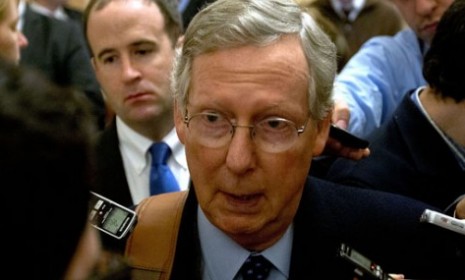The payroll tax cut deal: 3 reasons the GOP caved
Congress finally agreed on a temporary extension of the tax holiday, just days before it was set to expire

A free daily email with the biggest news stories of the day – and the best features from TheWeek.com
You are now subscribed
Your newsletter sign-up was successful
Bowing to intense pressure, House Republicans on Thursday agreed to extend the payroll-tax cut for two months. The Senate promptly signed off on the deal, ending a bitter stalemate that had threatened to hike the amount withheld from the paychecks of 160 million workers starting Jan. 1 (someone with a $50,000 annual income, for instance, would have had an extra $1,000 docked from his salary over the course of 2012). Congress can now resume work on extending the break past the two-month grace period. House Speaker John Boehner and his caucus had been insisting on a full-year cut, saying the "uncertainty" of a short-term extension would hurt businesses. So why did Republicans cave? Here, three theories:
1. They realized the public was mad... at them
Vulnerable House Republicans, worried about next year's reelection battle, were the ones who begged "the Republican leadership to relent," says Greg Sargent at The Washington Post. Their constituents were angry that the stalemate was threatening to take a chunk out of their paychecks — $40 a week for the average taxpayer. That's pretty solid confirmation that "the public is concluding that Republicans are the ones to blame for allowing the tax hike (to) creep ever closer to reality."
The Week
Escape your echo chamber. Get the facts behind the news, plus analysis from multiple perspectives.

Sign up for The Week's Free Newsletters
From our morning news briefing to a weekly Good News Newsletter, get the best of The Week delivered directly to your inbox.
From our morning news briefing to a weekly Good News Newsletter, get the best of The Week delivered directly to your inbox.
2. Obama forced GOP leaders to capitulate
Boehner said digging in against the temporary extension "may not have been the smartest thing in the world." That's an understatement, says Allahpundit at Hot Air. House Republicans spoonfed President Obama the opportunity to hold "a presser to demand action with middle-class taxpayers lovingly arrayed behind him," and those Republicans "caved" just a few hours later. "Now it looks like even more of a capitulation than it is. Merry Christmas from the GOP, champ." Oh, well. At least now "our dumb national nightmare is over."
3. Boehner managed to win a (minor) concession
This isn't the "best-possible version" of the bill hoped for, says Daniel Foster at National Review. Such a version would have fast-tracked a decision on the Keystone XL oil pipeline, included modest entitlement reform, and paid for it all without punishing new taxes. But in exchange for their cooperation, House Republicans did win "a 'technical correction' designed to 'minimize difficulties businesses might experience implementing the short-term, two-month tax cut extension.'" If this fix "really does make life easier for payroll processors, that's good!"
A free daily email with the biggest news stories of the day – and the best features from TheWeek.com
-
 The ‘ravenous’ demand for Cornish minerals
The ‘ravenous’ demand for Cornish mineralsUnder the Radar Growing need for critical minerals to power tech has intensified ‘appetite’ for lithium, which could be a ‘huge boon’ for local economy
-
 Why are election experts taking Trump’s midterm threats seriously?
Why are election experts taking Trump’s midterm threats seriously?IN THE SPOTLIGHT As the president muses about polling place deployments and a centralized electoral system aimed at one-party control, lawmakers are taking this administration at its word
-
 ‘Restaurateurs have become millionaires’
‘Restaurateurs have become millionaires’Instant Opinion Opinion, comment and editorials of the day
-
 The billionaires’ wealth tax: a catastrophe for California?
The billionaires’ wealth tax: a catastrophe for California?Talking Point Peter Thiel and Larry Page preparing to change state residency
-
 Bari Weiss’ ‘60 Minutes’ scandal is about more than one report
Bari Weiss’ ‘60 Minutes’ scandal is about more than one reportIN THE SPOTLIGHT By blocking an approved segment on a controversial prison holding US deportees in El Salvador, the editor-in-chief of CBS News has become the main story
-
 Has Zohran Mamdani shown the Democrats how to win again?
Has Zohran Mamdani shown the Democrats how to win again?Today’s Big Question New York City mayoral election touted as victory for left-wing populists but moderate centrist wins elsewhere present more complex path for Democratic Party
-
 Millions turn out for anti-Trump ‘No Kings’ rallies
Millions turn out for anti-Trump ‘No Kings’ ralliesSpeed Read An estimated 7 million people participated, 2 million more than at the first ‘No Kings’ protest in June
-
 Ghislaine Maxwell: angling for a Trump pardon
Ghislaine Maxwell: angling for a Trump pardonTalking Point Convicted sex trafficker's testimony could shed new light on president's links to Jeffrey Epstein
-
 The last words and final moments of 40 presidents
The last words and final moments of 40 presidentsThe Explainer Some are eloquent quotes worthy of the holders of the highest office in the nation, and others... aren't
-
 The JFK files: the truth at last?
The JFK files: the truth at last?In The Spotlight More than 64,000 previously classified documents relating the 1963 assassination of John F. Kennedy have been released by the Trump administration
-
 'Seriously, not literally': how should the world take Donald Trump?
'Seriously, not literally': how should the world take Donald Trump?Today's big question White House rhetoric and reality look likely to become increasingly blurred